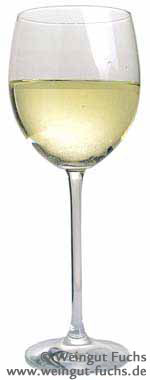
Acidity is a natural ingredient of wine. The natural acids of wine are mainly
During the ripening process of the grapes their content of acidity changes: increasing ripeness means increasing content of natural sugars and decreasing acidity. Briefly speaking: The higher the ripeness of the grapes, the lower their acidity.
This is the reason why we put emphasis on very ripe grapes and harvest them rather late. They go onto the press already having a naturally low level of acidity.
Additionally a wine’s acidity depends on the grape variety. Generally the acidity of Riesling is higher than that of other white grape varieties.
The higher the acidity of a wine is, the higher is the risk that it will cause problems for sensitive people. Persons having a tender stomach use to react on high acidity with heartburn.
If you are sensitive to a wine’s acidity, especially if easily suffer from heartburn, try to choose a wine having less acidity than 6 g/l. It also recommended to eat something with the wine.
In connection with wine the words “dry” and “sour” are often mixed up. The true meaning of dry is “not sweet” and has nothing to do with a wine’s acidity.